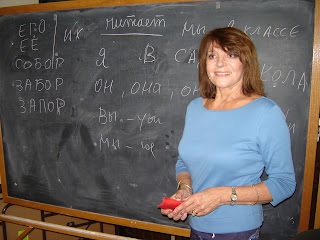 |
| Students evacuating their school |
Real Life Trauma
I interjected this phase of childhood into my third novel, Banners: Our Children, Our Future with several examples. I don't know if children a century ago were hardened against what we would consider life altering occurrences, or they just appear that way in faded back-and-white photos. Judging from the scene shown below, youngsters were often not shielded from the horrors of the day. In Banners, my young protagonists witnessed a such a hanging.
 |
| Bolsheviks executed by White forces |
* * *
“You didn't really see a guy get killed―did you?” Stepha
asked, his eyes widening.
“Yes, I did. I saw it at the cinema,” Maksim told him. “In
Chelyabinsk. He got shot by a firing squad.” Maksim had assembled
his subjects behind a collapsed izbah and conducted their
emotions like an orchestra. Looking from right to left, he lowered
his voice to almost a whisper. “The soldiers came and put this guy
against a wall,” he said and mimicked bringing up a rifle up to
eye. When the boys leaned closer, he shouted. “Then, POW. The
smoke came from the guns and he flew backwards and his cap fell off
and everything.” Maksim snapped his fingers, “Just like that, he
was dead.”
* * *
During the hanging, the boys jostled for favorable positions, both to witness the event and to pose afterward for the war correspondents.
* * *
“Come on. They're taking fotografia.” Maksim grabbed
Stepha's arm and together they ran toward the gallows."
* * *
* * *
When their path led past the gallows, Vanya hesitated. “I don't
want to go there.”
“It'll be alright,” Stepha assured him. "All you have to do is
hold your hand over your mouth and nose and hold your breath. Then
the spirits can't enter your body.”
* * *
Nightmares Real and Imagined
Perhaps those children from a century ago appear callous because they were subjected to a daily string of terrors, both real and imagined. Many endured lives full of sadistic school masters, drunken parents, mean-spirited relatives, brimstone hurling preachers and a string of bullies like Stepha's Kolya.
 |
| Just one of Stepha's childhood memories |
 | |
| Beware the graveyard ghosts |
 |
| Dragonfly |
* * *
The story of flying darning needles stitching children's lips
together might be just another of Teta Kataya's scary myths
but Stepha wasn't taking the chance. Even after he passed through
Old Rosina's tusked archway and was sure the stryadrakon was
gone, he waited before taking his hand away from his mouth.
* * *
Including childhood terrors in an historical novel broadens the culture of the period and also provides an avenue to expand your characters. Plus, it's fun to recall old childhood fears and discover new ones from the safety of old age.


